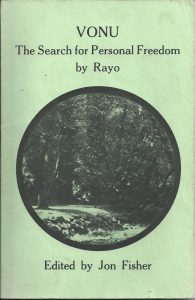The Non-Aggression Principle Explained by Rayo (December 1972)
Editor’s Note
Recently, I published an article titled A Disconcerting Day for the Voluntaryist Community. Within this article, I describe a couple of alarming things I witnessed on Fascistbook in less than a 12 hour span. Luckily, I have not borne witness to this continuation, but I have seen enough screenshots and statuses to know that this sort of thing is still going on, and it appears that it is happening more often.
For some context and clarification, I decided I would post a chapter from Rayo’s Vonu: The Search for Personal Freedom. This chapter is titled A Case for Non-Coercion Based on Rational Self-Interest. I honestly believe he can offer some valuable insight into this discussion. As I mentioned in my aforementioned article, anarchists deal with enough shit as it is. Debates are a fantastic thing, although, Fascistbook is not a place for philosophical discussions to be had. Please enjoy and consider providing your thoughts in the comment section. Laissez-faire.

Note: Due to a formatting error, footnotes in the article will be put in brackets.
[Begin Chapter]
A Case for Non-Coercion Based on Rational Self-Interest[1]
The ethical principle of non-coercion[2] can be stated: One should not initiate the use of physical force against a volitional being or against property created or acquired through voluntary consent.[3]
Many people espouse this principle. But most arguments for it are mystical or altruistic.[4] Some are blatantly so; they invoke “God’s Will” or “the Good of Society as a whole.” Others are more subtly so, and talk about “natural law” or “innate rights” without clearly defining those terms.
Some supposedly-egoistic arguments for non-coercivism are merely reformulations of Kant’s categorical imperative and thus mystical. One example: “If I deny inviolate rights of all others, I cannot claim such rights for myself.”[5] A critic might respond: “My recognition of inviolate rights of all others will predictably have only negligible effects on what rights, if any, all others consider inviolate (assuming no God who enforces uniform rights).”[6] Another example: “I don’t initiate force because I’d rather live in a world where most people don’t.”[7] A critic might respond: “I, too, would prefer such a world. But I have no reason to believe that my conduct will significantly affect the conduct of the world’s population.”
To base non-coercion on rational self-interest, what must I show? Only that I can expect overall benefits from adopting it – i.e. from espousing, internalizing and habitually acting in accord with it. I need not prove that coercion would never be in my self-interest. My decision to embrace or reject an ethical principle is not the same as my decision on action in a particular situation, although the former may decisively affect the latter. An ethical principle is only an abstraction, and like any abstraction, only approximates what it represents. Someone’s conception-of-A is not A – a map is not the territory. But maps and other abstractions are often useful.
In rare situations initiated force may be in one’s self-interest, and holding a non-coercive ethic (internalized as a habitual response) will mean loss. But this doesn’t prove that adopting the ethic was irrational. [A]ny principle is adopted prior to the situation. The probability of overall benefit or loss, judged at the time of adoption, is what is significant.
Similarly, in some automobile accidents one is more apt to survive if not encumbered with a safety belt. But this doesn’t prove that habitually fastening safety belts is a mistake. Overall probabilities of survival/non-injury are what count.
Most critics of non-coercion ethics espouse situation egoism, which is: Hold no general principles (except this one): always act according to self-interest as perceived in the situation at hand. Such a critic might say: “Why encumber yourself with principles? Why build spooks in your head? Why not play it by ear?”[8]
In reply: At any time I can consciously consider only a very small part of what is around me. I must deal with most of my environment thru habit and emotion. So the development of generally-appropriate habits is to my advantage. If I can walk over ordinary ground without deliberating about each step, I can better think about what is around.
An ethical principle, when internalized, becomes habits and attitudes. So the central question of this article reduces to: Is developing non-coercive habits and attitudes in my rational self-interest?
Consider the alternative: situation egoism. As each situation arises will I have time to deliberate? To the contrary, most opportunities to coerce are fleeting and require split-second decisions. Xerinye and Strakon[1] gave two examples. (1) You are one of the two astronauts is [in] a space craft returning to earth. Suddenly you discover that oxygen leaked out; only enough remains for one man. (2) You are alone and see a big wad of bills lying beside an unconscious form in a dark alley. If one hesitates – in the first situation the other astronaut may strike first or barricade himself; in the second situation the drunk may regain consciousness or someone else may come.
In both situations one is apt to benefit from coercion if one acts quickly, without deliberation. But even those examples involve many considerations. In the spacecraft, more oxygen might be generated by electrolysis of water. Or the men can spend periods in drug-induced coma to reduce oxygen consumption. Even if no alternative to death is immediately apparent, a solution may be found with further thought. Might it not be wiser to chance this, or even to join in some cheat-proof form of Russian roulette, then to face possible revenge by the other man’s friends and relatives back on earth as well as possible destruction of a craft in a flight? In the second situation: Is the drunk still unconscious? (Is it a drunk?) Might someone be watching from an unseen window? Might it be a trap, perhaps set by non-coercivists to profitably punish or eradicate coercivists?
Karate training emphasizes development of appropriate habitual responses. A combatant who tries to think thru each move is soon disabled. Similarly, someone who hopes to gain from coercion must not only reject principles, he must train himself to spot opportunities and act quickly, else he miss or bungle them. This is one cost of coercion to the coercer: time/effort/attention which could otherwise be devoted to other pursuits.[9][10]
A second, obvious cost is risk of defense or retribution by the victim or his friends or agents.
A third cost to the coercer is ostracism. He is not likely to develop close, long-term relationships with people he finds desireable. Even other coercivists would rather associate, between crimes, with those who are habitually non-coercive. Even if a coercivist is never caught – even if he never actually commits coercion, he gives subliminal clues to his attitude and habits thru gestures, expressions, inflections, mannerisms, and false starts. He may claim to be non-coercive, but in vain. Others will be uneasy when around him and will prefer to avoid him, although they may not always know why.
How serious a loss this is depends on his life-style and goals. If he prefers to drift around the fringes of big cities, forsaking close friendships, his loss may not be great.[11] But achieving freedom will be very difficult. Freedom, thru wilderness vonu, international mobility, urban hideaways and/or black marketeering, is enhanced by close, trustworthy confederates.
Many freedom achievers are especially sensitive to subliminal indications of attitudes and habits, because their freedom in part depends on spotting spies and other security risks. They, especially, are likely to shun a situation egoist. (How big a reward might be offered for information? How much could he rip off? Will he be tempted? Etc.)[12]
Conceivably a coercivists might become such a good actor his friends would never catch on. But this entails the greatest cost of all. He must constantly suppress, inhibit, fake – and live in fear of a slip giving him away.[13] I doubt that he can do this and retain a deep capacity for joy. And without it his ‘successful’ rip-offs will be hollow triumphs.
Could a band of coercivists avoid these problems by agreeing not to coerce each other, only outsiders? This is often attempted. Every State is such an attempt. But without a general principle of some kind, any agreement is without basis.[14] Some will turn on others the first time they perceive an advantage. And this possibility leads to distrust and sometimes pre-emptive strikes.
I do not claim that adopting non-coercive ethics is in the self-interest of everyone. But I conclude, that for myself at least and probably for most who seek to control their own lives, non-coercivism will maximize efficiency, probable safety, trade opportunities and emotional capacity.
AUTHOR’S NOTES:
1 This article was prompted by and is in part a reply to: “Every Man for Himself,” Krista Xerinye and N. Strakon, July 20, 1971, Invicticus.
2 This is sometimes called the libertarian ethic. I now avoid that term because many who agree with non-coercion, including myself, reject other elements of libertarianism, especially its strategy and politics.
3 This give rise to complex and controversial boundary questions such as: What constitutes force? What is a volitional being? What constitutes property, especially in the case of land and inventions? What constitutes initiation? But herein I consider only black-and-white cases of coercion/non-coercion.
With boundary problems, this seemingly-simple concept becomes very cluttered. I wonder if there is an alternative formulation (set of general principles) which handles boundary questions more neatly? (Analogy: Ptolemiac and Copernican frames of reference for astronomy.) But I don’t think rejecting ethical principles is the answer.
4 But altruism can always be resolved to either mysticism (“it is my Duty to (society, country, race, humanity)”) or egoism (“I enjoy helping others”).
5 The Categorical Imperative: “Act so that you can will that the maxim of your action should be a universal law.” To point up the equivalence to it (or to “The Golden Rule”) and its inadequacy as a basis for non-coercion, consider a converse example: “If I grant to all others the right to rape me, then I can claim the right to rape anyone.”
6 Xerinye and Strakon1 hold that “Natural rights is an invalid concept.” Since ‘rights’ has religious and authoritarian connotations, I prefer to avoid the term rather than attempt to salvage it.
7 But if “subculture” or “tribe” is substituted for “world” this becomes an argument based on egoism, since one can choose and be chosen by a subculture/tribe.
8 I doubt that a situation ethics – absence of principles – is readily internalized. More likely I suspect, someone who claims this as his ethic is influenced by ethics (attitudes and habits) he has picked up from other people, especially as a child. It’s easier, I think, to replace habits and attitudes with different ones than to simply drop them.
9 Alternatively, he can choose a career in a form of crime (mail-order fraud?) not requiring split-second decisions. But this also involves much time.
10 Some of these points were raised by previous Invictus articles responding to Xerinye and Strakon.
11 As a potential friend or business associate, a situation egoist may be considered less desireable than a traditionally religious person who, while not consistently non-coercive, is at least fairly predictable.
12 About internalization: Conscious conclusions about what I ought to do, strongly affect my attitudes but with a time delay of several years. Assuming as much delay in others, I would not expect a newly-avowed non-coercivist to act so consistently, and would tailor any association accordingly.
13 This is also an argument against “conventional” living arrangements for vonuists and applied libertarians, which involve spending most time around hostile people.
14 An association (and agreement) among a band of coercivisits could be and often is on the basis of the general principle: One should not associate with anyone who has coerced him or his fellows (but it’s okay to associate with people who have coerced outsiders). Such an association will continue only so long as anticipated benefits of future association exceeds benefits of coercion against a fellow. This depends on large part on differences between fellows and outsiders. The most durable governments and lesser criminal syndicates have been those different in culture or race from their subjects/victims. A wayward member could not easily/attractively “disappear” and find new associates.
A State invariably tries to indoctrinate its subjects, especially its lower-echelon functionaries, with either or both of the following beliefs: (1) The enemy is significantly different – not really human and therefore “fair game.” (2) The enemy is really the aggressor; the State acts in self-defense. In either case the State is trying to invoke general ethical principles.
(from INVICTUS, December 1972)
(Editor’s Note: Invictus is no longer being published.)
[End Chapter]
For more great content like this, please consider donating to Liberty Under Attack. Alternatively, sign up for a free trial through Audible, receive a free audiobook, and help support us in the process. Lastly, make sure to support LUA via Patreon.



Trackbacks/Pingbacks